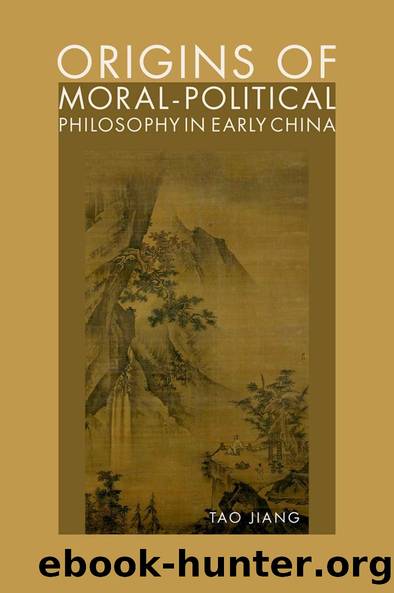Origins of Moral-Political Philosophy in Early China by Tao Jiang

Author:Tao Jiang [Jiang, Tao]
Language: eng
Format: epub
Publisher: Oxford University Press
Published: 2021-08-27T04:00:00+00:00
C. Shang Yangâs Political Analysis of Human Nature
As we have seen earlier in the book, human nature was a critical issue of debate among classical Chinese thinkers, especially among the Confucians. Whatever position a thinker took on human nature, it would inevitably factor into his larger moral-political project. That is, Confucian thinkers treated human nature first as an issue in moral discourse and only secondarily as a political consideration since the latter was usually treated as derivative of the former. However, Shang Yang differed in his approach to human nature. He treated human nature primarily as a problem of political governance such that the most effective political system for him was one that took human nature as given, instead of trying to transform human nature. That is, for Shang Yang, problems presented by human nature would require a political solution, not a moral one.
Shang Yang was skeptical about the political system that was based on a promissory note of moral education aiming at transforming the problematic aspects of human nature, selfishness being one of the most prominently featured flaws in the classical discourse. Shang Yang did not think that moral education was or should be the solution to the problem of human selfishness. Rather, the problem of human selfishness required a political solution. The ingenuity of his political project lay in the idea that the selfishness of people should and could be redirected as a source for political order, through the mechanisms of reward and punishment, given peopleâs penchant for wealth and status and aversion to poverty and pain.
The nature of the people is to seek food when they are hungry, to seek respite when they are belabored, to seek joy when they are embittered, to seek glory when they are humiliated: this is the peopleâs disposition. In seeking benefit, the people lose the standard of ritual; in seeking name, they lose the constant of their nature. How can I demonstrate this? Now, criminals above violate the prohibitions of rulers and superiors and below lose the ritual of subjects and sons; hence, their name is dishonored and their body endangered, but they still do not stop: this is because of benefit. In the generations of old, there were men-of-service (shi) who did not have enough clothes to warm their skin or enough food to fill their bowels; they exerted their four limbs and injured their five internal organs above, but they behaved ever more broad-heartedly: this is because of name (repute). Hence, it is said: wherever name and benefit meet, the people will go in this direction. (Lord Shang 6.4)
Download
This site does not store any files on its server. We only index and link to content provided by other sites. Please contact the content providers to delete copyright contents if any and email us, we'll remove relevant links or contents immediately.
| Anthropology | Archaeology |
| Philosophy | Politics & Government |
| Social Sciences | Sociology |
| Women's Studies |
Born to Run: by Christopher McDougall(7127)
The Leavers by Lisa Ko(6948)
iGen by Jean M. Twenge(5416)
Sapiens by Yuval Noah Harari(5372)
Spare by Prince Harry The Duke of Sussex(5197)
The Kite Runner by Khaled Hosseini(5180)
Machine Learning at Scale with H2O by Gregory Keys | David Whiting(4313)
Bullshit Jobs by David Graeber(4192)
Never by Ken Follett(3957)
Goodbye Paradise(3810)
Livewired by David Eagleman(3775)
Fairy Tale by Stephen King(3399)
A Dictionary of Sociology by Unknown(3085)
Harry Potter 4 - Harry Potter and The Goblet of Fire by J.K.Rowling(3074)
The Social Psychology of Inequality by Unknown(3031)
The Club by A.L. Brooks(2926)
Will by Will Smith(2920)
0041152001443424520 .pdf by Unknown(2846)
People of the Earth: An Introduction to World Prehistory by Dr. Brian Fagan & Nadia Durrani(2739)
